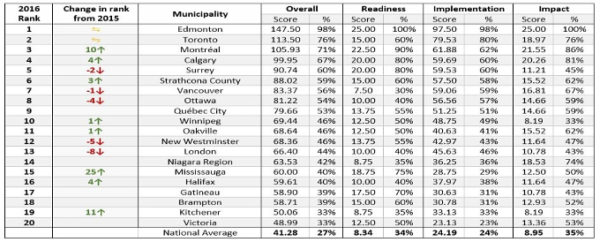
 Edmonton, Toronto and Montreal have taken the first, second and third spots respectively on the 2016 Open Cities Index of 20 Canadian cities, ranked in order of their use of open data to encourage the development of open, transparent, and accountable government.
Edmonton, Toronto and Montreal have taken the first, second and third spots respectively on the 2016 Open Cities Index of 20 Canadian cities, ranked in order of their use of open data to encourage the development of open, transparent, and accountable government.
The ranking is compiled as a partnership between the Public Sector Digest and Canada’s Open Data Exchange.
“Cities are in the best position to unlock the value of open data,” said Dr. Kevin Tuer, Managing Director of Canada’s Open Data Exchange. “Open data constitutes the vital signs of a city. As such, it can be used to assess the health of the city. Moreover, it can be used by the private sector – including start-ups and SME’s – to formulate solutions to problems and challenges that the city is facing. And, open data can be used to assess the effectiveness of the solution. The Open Cities Index plays an important role in helping cities develop a framework for their open data initiatives with a focus on open data usage in support of the creation of products and services that complete the value exchange.”
For the second year in a row, the City of Edmonton has taken the Open Data Exchange top spot, with Toronto also remaining in the second position, with Montreal rising 10 spots to claim the number three position.
The 2016 Index includes five municipalities entirely new to the list, including Quebec City, the Niagara Region, Gatineau, Brampton, and Victoria, B.C.
Even more impressive than Montreal’s 10-spot improvement, Mississauga earned the “Most Improved” title for jumping 25 spots to find itself in 15th place, while Strathcona County, Alberta climbed three positions to sixth place and earned a “Small City, Big Impact” recognition, for cities with a population under 100,000.
The Open Data Exchange scored Edmonton at 98% for its open data program, with particular strengths recognized in the Readiness and Impact categories.
Edmonton was also recognized for staging regular open data hackathons for local start-ups, adopting an official Open Data Plan and Open Data Policy, and publishing online, up-to-date, freely available, machine-readable, automated datasets that are linked to APIs under almost all 32 categories of datasets included in the Open Cities Index, including Readiness, Impact and Implementation, addressing the city’s approach to budgets, election data, construction contracts, air quality and crime statistics, among other things.
Toronto also scored highly in the Implementation category with the publication of its diverse high-quality datasets, while its online portal also includes restaurant inspection data, and the City’s Open Government Committee tracks its own progress on Open Data, Open Engagement, Open Information and Open Culture through the development of performance measures and indicators.
Most other Canadian municipalities, by contrast, don’t even have access to its own restaurant inspection data, as it’s usually collected by another branch of government and lacks the open data partnership necessary to share across jurisdictions.
Anyone who has followed the progress of third-place Montreal since the arrival of the Coderre administration just a few years ago might be surprised to witness how much the city has improved in terms of data transparency and its effort to improve quality of life through a comprehensive Smart City initiative.
The Open Data Exchange is a Waterloo Region-based public-private-academic partnership, founded by the University of Waterloo, D2L (Desire2Learn), CDMN (Canadian Digital Media Network), OpenText and Communitech, with matching funds from the federal government.
Public Sector Digest is a monthly digital and quarterly print publication advocating for Canada’s public sector, and part of a network of researchers and authors spanning 20 countries on six continents.
“We’re very proud of the progression made by Montreal, which has been recognized by Public Sector Digest in its annual evaluation,” said Harout Chitilian, Montreal’s representative for Smart City and information technology initiatives. “This recognition underlines our efforts at being recognized as a world leader among intelligent communities. Our efforts at deploying data openness policies are now bearing fruit. An important lever for transparency, open data policies pave the way for improved services to citizens through technology.”
In June, Montreal won the Intelligent Community of the Year award, bestowed by New York-based think-tank, the Intelligent Community Forum (ICF).

Leave a Reply
You must be logged in to post a comment.




 Share
Share Tweet
Tweet Share
Share




Comment